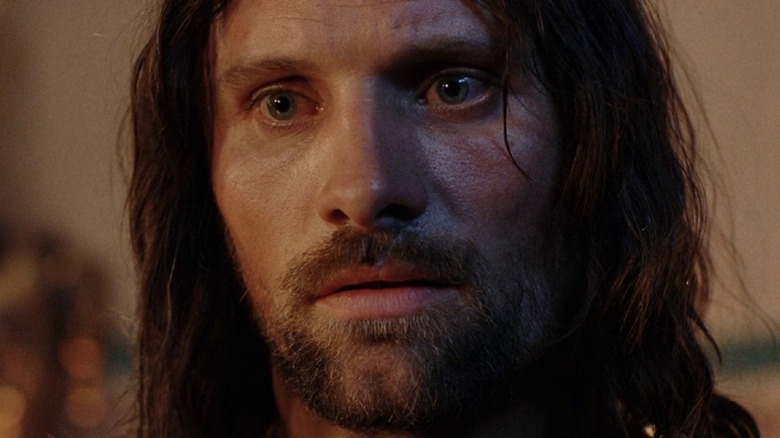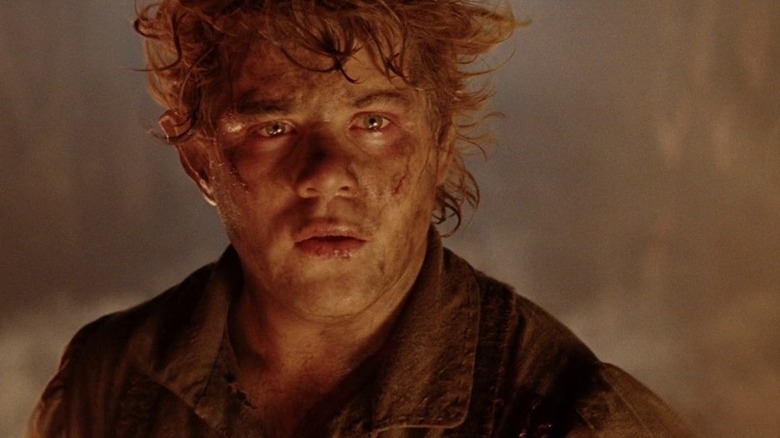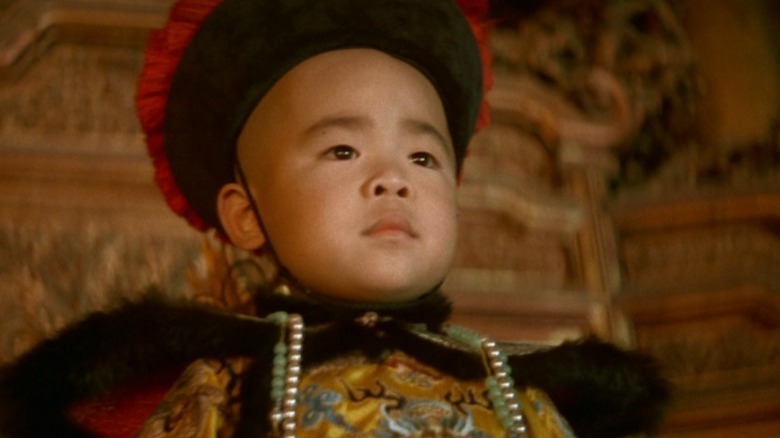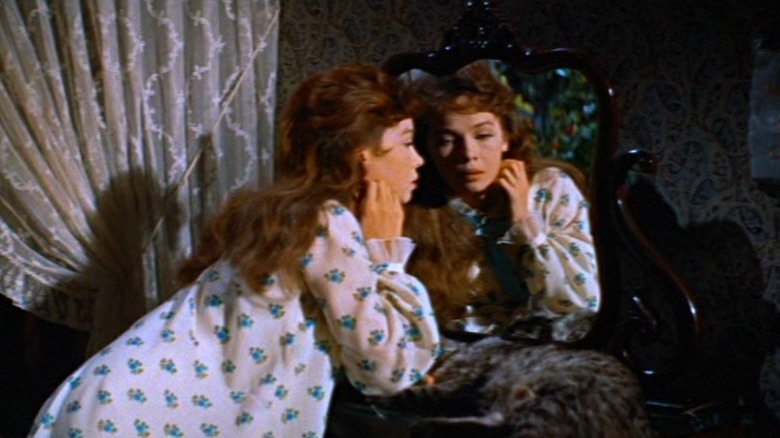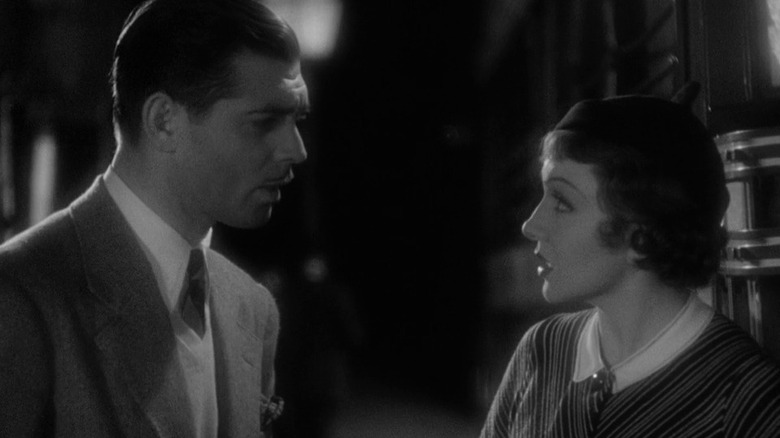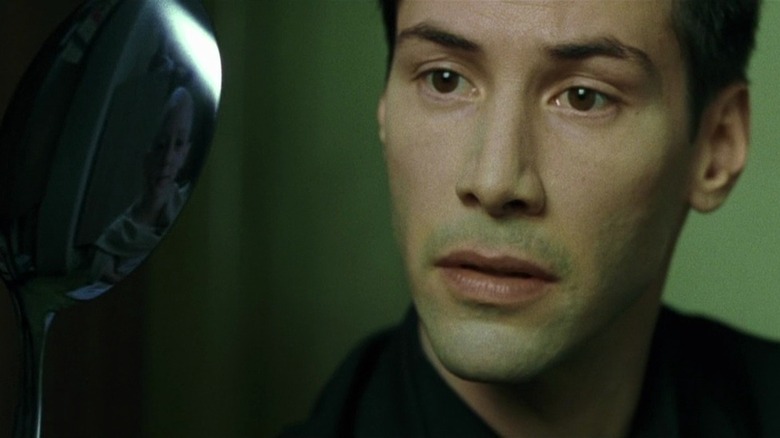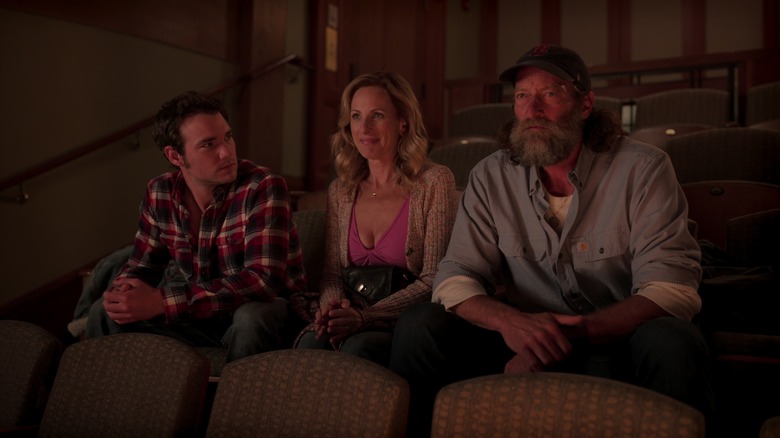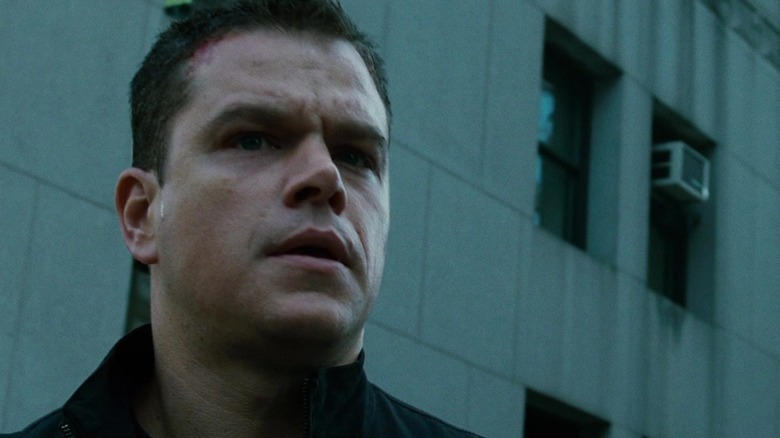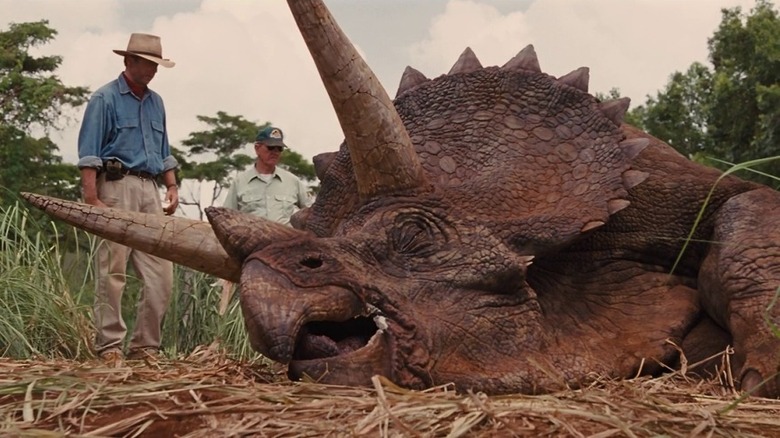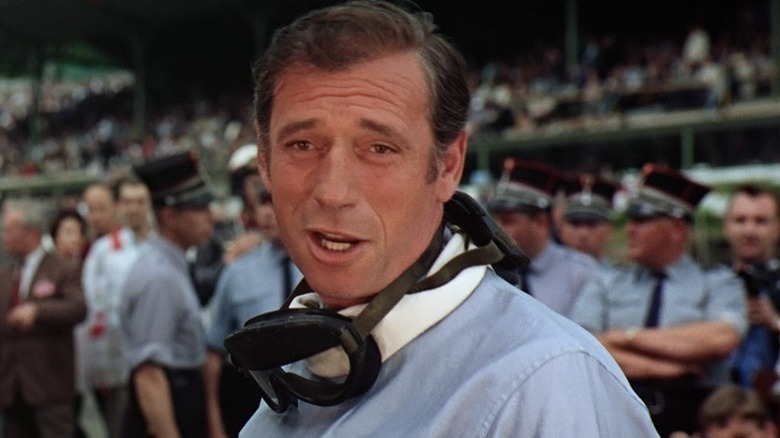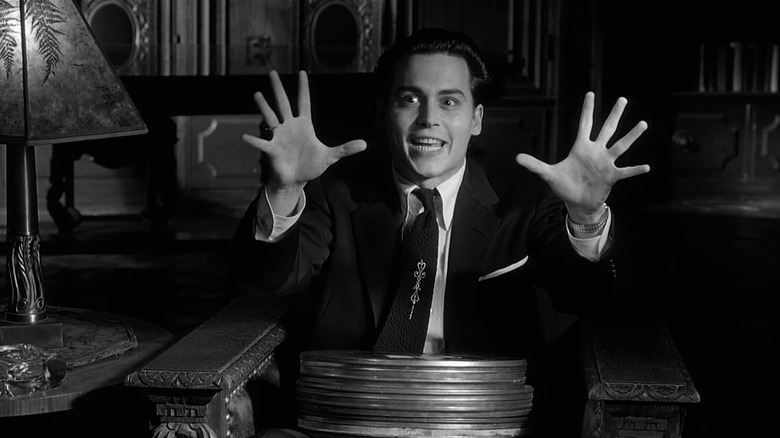Movies That Won Every Single Academy Award They Were Nominated For
Awards season marks an important moment in the movie calendar when the stars assemble to celebrate the films that captured audiences in the previous year. Before we had tools like Rotten Tomatoes or Metacritic to tip us off about a film's reception, the Oscars — which began in 1929 — were an important way to distinguish the cream of the movie crop. The Academy Awards remain the highest prize in cinema, but more recently they've become known for their struggle to attract viewers, criticisms over the lack of diversity (per Insider), and disastrous high-profile moments and scandals.
While we don't necessarily need the Academy to tell us what the best movies are — and plenty of fans will choose to engage or not engage with a movie on their terms — there is still a certain prestige in being able to call your work an Oscar winner. Sitting at the very top of this list are those rare movies that hold a perfect record, sweeping every category they are nominated for. They run the gamut from large-scale dramas to short films to crowd-pleasing blockbusters, and whatever they did well, they did better than any other movie that year. These are the movies that won every Academy Award they were nominated for.
The Lord of the Rings: The Return of the King
There is a particularly elite group of films that share the honor of the most Oscars of all time, winning 11 golden statuettes each: "Ben-Hur," "Titanic," and "The Lord of the Rings: The Return of the King" (via Statista). While all three took home the same number of awards, "Return of the King" is technically the most successful as it went 11 for 11 in all the categories it was nominated for. As the final installment of "The Lord of the Rings" trilogy, "Return of the King" cleaned up at the 76th Academy Awards. While the previous films had been recognized at the Oscars, the fact that "Return of the King" swept all categories — including best picture — was seen by many as a way of giving recognition to the entire franchise (per Vanity Fair).
But that doesn't mean "The Return of the King" didn't richly deserve the prizes it won. A stunning technical achievement, it won awards for visual effects — the only Oscar that all three "Lord of the Rings" movies took home — as well as sound mixing, makeup, costumes, art direction, score, and song. Perhaps the biggest surprise, however, was that it also landed awards outside of the technical categories, picking up best adapted screenplay, best editing, best director, and best picture — a milestone moment for the fantasy genre.
The Last Emperor
"The Last Emperor," a 1987 epic biographical film directed by Bernardo Bertolucci, tells the story of the life of Puyi — who became the last emperor of China at the age of just two — all the way through his death after a lifetime spent largely in exile. The film was a co-production between Italy, the United Kingdom, and China — the latter of which allowed the movie to film for eight weeks in the real "Forbidden City" that had been home to its emperors for centuries (via Britannica). After decades of arthouse acclaim, it was a breakout critical and box office success for Bertolucci — the highlight of a long and storied career.
"The Last Emperor" won nine Academy Awards, and was the first non-English-language film to win the award for best picture, paving the way for "Parasite" more than 20 years later. It also walked away with awards for best director, adapted screenplay, art direction, cinematography, editing, sound, costume design, and original score.
Gigi
Taking home nine for nine at the 31st Academy Awards was the 1958 musical "Gigi." Set in turn-of-the-20th-century Paris, it follows a young girl — the titular Gigi (Leslie Caron) — who is being groomed by her grandmother and great-aunt to be a courtesan, but instead falls in love with a wealthy playboy. It's the source of the song "Thank Heaven for Little Girls" — the lyrics of which haven't aged terribly well out of context — and is widely regarded as one of the last great productions of the golden age of Hollywood musicals.
As well as taking home the top prize, "Gigi" won for director, adapted screenplay, art direction, cinematography, costume design, film editing, original score, and sound. It also briefly held the record for the movie with the most Oscar wins, until "Ben-Hur" left it in the dust the following year.
It Happened One Night
1934's "It Happened One Night" is one of the top 10 romantic comedies of all time (per the American Film Institute), and an early classic of the screwball genre that boosted the careers of legendary director Frank Capra along with stars Clark Gable and Claudette Colbert. The plot follows a wealthy socialite (Colbert) who, after running away from her family, ends up on a bus bound for New York City. Along the way, she meets a newspaper reporter (Gable) who agrees to help her in exchange for an exclusive story. The two soon find themselves falling in love, but their plans are complicated by the woman's wealthy father, who is determined to bring her back home.
A huge commercial and critical success, "It Happened One Night" won all five of the Academy Awards it was nominated for, including best picture, director, best actor, best actress, and adapted screenplay. This made it the first film to win all of the "big five" categories — a feat that would not be repeated until "One Flew Over the Cuckoo's Nest" at the 1976 ceremony, and "The Silence of the Lambs" in 1992.
The Matrix
Although it didn't receive nominations for best picture or best director, 1999's "The Matrix" swept all four Oscars it was up for, winning best sound, best sound effects editing, film editing, and visual effects. At the 72nd Academy Awards, it was "American Beauty" that took home the top prizes — winning five out of the eight it was nominated for — but arguably "The Matrix" has left a far bigger impact on pop culture. Beyond the stunning visual spectacle, impeccable fight choreography, and innovative "bullet-time" sequences, it has become an influential touchstone, with themes that only become more relevant as the years pass.
"The Matrix" franchise has spawned a number of sequels, an animated spin-off, and several video games, and is still enduringly popular to this day. The clean sweep by "The Matrix" gave blockbuster fans something to root for, and hope that it wasn't just typical dramas like "The Cider House Rules" or "Boys Don't Cry" that could take home major awards.
CODA
"CODA" (which stands for "child of deaf adults") won three out of three Academy Awards, including best picture. The story follows a 17-year-old girl named Ruby (Emilia Jones), who is the only hearing member of her family. As she starts to pursue her passion for singing, she is forced to make a decision about whether to stay with her family and continue to be their translator and support system or to leave and pursue her own dreams.
After premiering at the Sundance Film Festival — where it won the Grand Jury Prize — "CODA" was picked up by Apple TV+ and released for an Oscar-qualifying run in theaters before hitting their streaming platform. A compelling and heart-warming film, it's also notable for its authenticity and the use of deaf actors in lead roles. "CODA" is a cinematic milestone for the representation and inclusion of the deaf community in mainstream cinema and culture. In addition to best picture, it picked up best adapted screenplay for its script by Sian Heder — who also directed the film — and best supporting actor for Troy Kotsur.
The Bourne Ultimatum
There's a well-known saying in Hollywood often attributed to filmmaker Robert Bresson: "A film is made three times: first on the page, then on set, and finally in the edit." At the end of 2007, two modern classics — "There Will Be Blood" and "No Country For Old Men" — were going head to head for all of the major awards. While the former won best actor for Daniel Day-Lewis and cinematography, and the latter won best adapted screenplay and best picture, "The Bourne Ultimatum" upset all of the major contenders for best film editing. Paul Greengrass' propulsive, moody third installment in the "Bourne" franchise wasn't nominated for best picture, but when it received the prize for editing, it put some truth to Bresson's words.
"The Bourne Ultimatum" also won both sound awards — best sound mixing and best sound effects editing — and its success helped establish the franchise as one of the most popular and successful action-thriller series of all time.
Jurassic Park
"Jurassic Park" wasn't even the most acclaimed or award-winning movie that Steven Spielberg directed in 1993, and he would take home best picture and best director for "Schindler's List," along with a slew of other awards at the 66th Academy Awards. But in terms of a clean sheet, "Jurassic Park" went three for three at the Oscars, rounding out a very good night for Spielberg. The dinosaur adventure movie won awards for visual effects, sound, and sound editing — receiving due recognition for the spectacle that relied as much on practical effects and puppetry as it did on CGI to bring the dinosaurs back to life.
Beloved for decades, "Jurassic Park" has become one of the 51 movies to gross over a billion dollars worldwide, along with several of its sequels (via Box Office Mojo). A timeless warning against the perils of playing god with nature, "Jurassic Park" remains the defining classic dinosaur movie and one of the best franchise tentpoles of the '90s.
Grand Prix
John Frankenhemier's 1966 movie "Grand Prix" is a classic sports movie, and a stunning achievement combining actual footage of Grand Prix races with footage recreated for the movie. It starred James Garner as one of four racers competing in a fictionalized version of the 1966 Grand Prix racing season — a series of ritzy motor events all over Europe. It's also worth checking out for a small role from a very young Jessica Walter, the late matriarch of both "Archer" and "Arrested Development" fame.
For its thrilling action sequences, "Grand Prix" would go three for three in technical categories at the Academy Awards. It won best sound and best sound effects editing — well-earned for the way it nimbly balances dialogue with the dynamic sounds of motor racing. It also beat out high-profile contenders like "Who's Afraid of Virginia Woolf?" and "The Sand Pebbles" for best film editing. It used a then-revolutionary split-screen method to follow multiple racers at the same time — a technical achievement that wowed moviegoers and locked up the awards.
Disney's enduring Oscars success
Disney's legendary 1940 animated classic "Pinocchio" didn't have a best animated feature category to win at the time, but it did pick up awards for original score and original song for "When You Wish Upon a Star." This particular two for two combination of score and song would be repeated three more times by Disney movies in the '80s and early '90s "renaissance era" when the animation studio released some of their most beloved animated musicals.
In 1989, "The Little Mermaid" won awards for composer Alan Menken's score and memorable ditty "Under the Sea" — in collaboration with songwriter Howard Ashman. In 1994, storied film composer Hans Zimmer had his music for "The Lion King" recognized alongside Elton John and Tim Rice for the romantic ballad, "Can You Feel the Love Tonight." "The Lion King" had two other nominations for original song that year, so while it technically had four nominations, it won the only two Oscars that it could. Again, just a year later, Menken won again for "Pocahontas" and the original song "Colors of the Wind" — both of which were co-written with musical theater legend, Stephen Schwartz.
With the advent of the best animated feature award in 2001 — first awarded to "Shrek" at the 74th Academy Awards — animated movies now have more options to put together winning two for two combinations. In 2014 "Frozen" won for animated feature and original song for the iconic ballad "Let It Go," and 2017's "Coco" received the same two awards for animated feature and the song "Remember Me."
Sentinels of Silence
The 1971 documentary shot "Sentinels of Silence" has the unusual distinction of being the only short film to win in two different categories, taking home the awards for both best documentary short, and best short film overall. Comprised of 18 minutes of mostly helicopter footage of the ruins of ancient Mayan civilization, it had voice-over work by Orson Welles, explaining what the Mayans left behind and the mystery of their great civilization's disappearance.
Perhaps because of "Sentinels of Silence" and its victory in two categories, this was also the last time that the Academy allowed a short film to compete in more than one category. Now, short films are categorized as animated, live action, or documentary. "Sentinels of Silence" was also released in a Spanish-language version — swapping Welles for Ricardo Montalban — and was a fascinating look at Mayan culture in a time well before aerial footage was all that common, and there was no internet to bring the world's mysteries to our fingertips.
The Great Gatsby double dips twice
Double your pleasure, double your pair of Oscar wins: F. Scott Fitzgerald's classic American novel "The Great Gatsby" has the distinction of being adapted into two different movies, that both went two for two at the Oscars in their respective years. A 1974 adaptation directed by Jack Clayton — with a screenplay by the legendary Francis Ford Coppola — received mixed reviews and didn't compete for any of the heavyweight categories. However, it went undefeated in the categories of best costume design and best original score at the 1975 ceremony.
Nearly four full decades later, Baz Luhrmann's 2013 version of "The Great Gatsby" similarly underwhelmed critics but dazzled with its production value to the tune of two statues. It replicated the earlier adaptation's win for best costume design, and also took home best production design for its big-budget, sprawling set pieces that really brought the lavish parties to life.
The rest of the two for two club
Still a feat to be celebrated, there are a number of films that have won two for two, beginning with the very first best picture winner, "Wings," in 1929. A further 12 movies have repeated this success, with the drama "Black Narcissus" winning best cinematography and best art direction in 1948 — when there were still separate categories for color and black and white. 1966's "Born Free" won Oscars for best score and the titular well-known song, and "Cocoon" picked up an acting prize for Don Ameche and best visual effects in 1986. Also winning an acting and technical award was 1994's "Ed Wood," where Martin Landau's sensitive performance was recognized alongside the film's makeup.
At the 68th Academy Awards, the historical drama "Restoration" and the suspenseful "The Usual Suspects" both maintained a perfect record and collected two awards each. 2006's "An Inconvenient Truth" won best documentary along with original song for Melissa Etheridge's "I Need to Wake Up." Finally, 10 years apart, biopics "The Iron Lady" and "The Eyes of Tammy Faye" picked up the brace of best actress and best makeup for the transformative performances of Meryl Streep and Jessica Chastain respectively.
